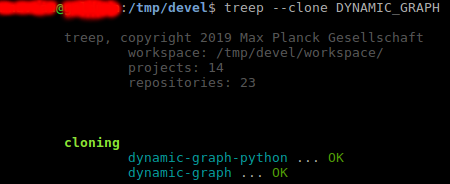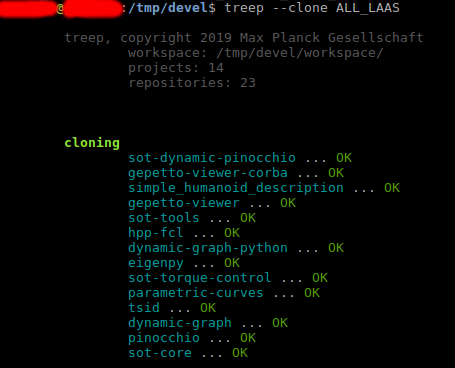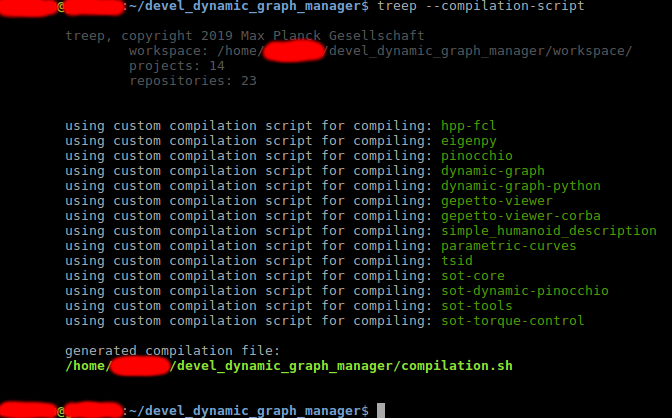Table of Contents
2.1/ Introduction
In here we are going to explain the different way of obtaining the code base. And in particular the dependencies. We highly recommand a binary installation of the dependencies.
2.2/ Binary Installation
2.2.1/ Install using the official image on UBUNTU 16.04
First clone the official image git repository.
The repositories contains convenience installation scripts for ubuntu. The most useful script is "official/setup_ubuntu". This script is meant to be called after a fresh installation of ubuntu, and install all typical dependencies required for programming robots. These include ROS, dynamic graph and related "robot-pkg" software (e.g stack of task and pinocchio). Only 16.04 is fully supported. The script will also work on 14.04, but mostly ROS and dependencies related to SL will be installed. Usage:
This setup script is sometimes updated. You may run it again:
To see the list of software this script install (and how it install it), visit the related dockerfile (e.g. for 16.04 : https://git-amd.tuebingen.mpg.de/amd-clmc/ubuntu_installation_scripts/blob/master/official/ubuntu_16_04/docker/Dockerfile).
With this process a file in /opt/openrobots/setup.bash should have been created. In order to use the binary installation you MUST source this file:
one can add this line to its ".bashrc"
2.2.2/ Do the same as the official image but install uniquely the dynamic graph.
First get the robotpkg PPA. Assuming you are using Ubuntu 16.04, if not, please adjust the "xenial" to the output of lsb_release -c:
Install the following packages from robotpkg using apt-get:
Export the following environment variables e.g. by adding exports in ~/. bashrc file:
2.2.3/ Troubleshooting
- Python 3: When using python3 and you installed packages with prefix /opt/openrobots/, you have to remove the python2.7 path and add the python3.5 one.
- Compilation problem: upon catkin_make the package "dynamic-graph" is not found.
- make sure the environment variable concerning /opt/openrobots has been set. See the previous paragraph. In order to verify this one can run: env | grep openrobots
- The folder /opt/openerobots does belong to roor and/or does not have the correct permissions. In order to fix this one can do: sudo chown root:root -R /opt/openerobotssudo chmod 755 -R /opt/openerobots
- make sure the environment variable concerning /opt/openrobots has been set. See the previous paragraph. In order to verify this one can run:
2.3/ From source Installation
2.3.1/ For python2
- first make sure you have treep installed. orpip2 install --user treeppip3 install --user treep
- Then clone the different packages.
- For just the dynamic graph: At this point you should see something like this:mkdir devel # or your favorite development foldercd develgit clone git@github.com:machines-in-motion/treep_machines_in_motion.gittreep --clone DYNAMIC_GRAPH

- If you decided to clone every package it would look like this: At this point you should see something like this:mkdir devel # or your favorite development foldercd develgit clone git@github.com:machines-in-motion/treep_machines_in_motion.gittreep --clone ALL_LAAS

- For just the dynamic graph:
- Now let us assume you have something clone in your workspace/src folder.
- The next step is to generate the compilation script. The ouput:treep --compilation-scriptAt this point treep generated a compilation script in bash that you need to execute anytime you do the compilation.

- If the compilation script is not an executable you should do a The compilation script is based on the python script in the treep_dynamic_manager package. A quick glance should allow you to tune the installation folder and type of compilation (Debug/Release/...) A "dynamic_graph_setup.bash" is generated as well in the installation folder. If you source it you will tell your system to use the installed binary.chmod +x compilation.sh
- The next step is to generate the compilation script.
- Launch the compilation: This should build and install all the repositories../compilation.sh
- Troubleshooting with "sphinx" sudo -H pip2 install sphinx
- Troubleshooting with "sphinx"
2.3.2/ For using python3 alongside python2
Installing the eigenpy and pinocchio libraries into the same folder creates problem when loading the libraries. Instead of using the boost_python-py35 library, eigenpy also tries to load the boost_python- py27 library. To avoid this, it is recommended to
- create a separate "devel" folder for the python3 installation like devel_py35
- make sure to source the corresponding "dynamic_graph_setu
p.bash". And to edit the Otherwise, eigenpy tries to load boost_python-py27 libraries. This boils down to using separate functions to source either python2 or python3:export PYTHONPATH=/opt/openrobots_py35/lib/python3.5/site-packages:$PYTHONPATHIn order to build the pacakges for Python 3, use the cmake configuration as:source_devel_py27() {# robotpkg installation.export PATH=/opt/openrobots/bin:$PATHexport PKG_CONFIG_PATH=/opt/openrobots/lib/pkgconfig:$PKG_CONFIG_PATHexport LD_LIBRARY_PATH=/opt/openrobots/lib::/opt/openrobots/lib/plugin:$LD_LIBRARY_PATHexport PYTHONPATH=/opt/openrobots/lib/python2.7/site-packages:$PYTHONPATHexport LD_LIBRARY_PATH=$LD_LIBRARY_PATH:/usr/local/lib/}source_devel_py35() {export PATH=/opt/openrobots_py35/bin:$PATHexport PKG_CONFIG_PATH=/opt/openrobots_py35/lib/pkgconfig:$PKG_CONFIG_PATHexport LD_LIBRARY_PATH=/opt/openrobots_py35/lib:/opt/openrobots_py35/lib/plugin:$LD_LIBRARY_PATHexport PYTHONPATH=/opt/openrobots_py35/lib/python3.5/site-packages:$PYTHONPATHexport LD_LIBRARY_PATH=$LD_LIBRARY_PATH:/usr/local/lib/}For using the catkin project using python3, install the following packagescmake .. -DCMAKE_BUILD_TYPE=Release -DPYTHON_EXECUTABLE=`which python3` -DCMAKE_INSTALL_PREFIX=/path/to/your/devel_py35/workspace/develand build the catkin workspace with python3 (make sure you have source the python3 environment variables using source_openrobots_py35)pip3 install rospkg catkin_pkgcatkin_make -DCMAKE_BUILD_TYPE=Release -DPYTHON_EXECUTABLE="`which python3`"
2.4/ Installation of dynamic graph manager
- First make sure you have treep installed. orpip2 install --user treeppip3 install --user treep
- Clone the repository manager "treep_machines_in_motion". All actions on the repositories can be done via the "treep" executable. If you do not have the ssh key allowing you to download it, please contact Maximilien Naveau (maximilien.naveau@gmail.com) or Vincent Berenz (vberenz@tue.mpg.de).cdmkdir devel # devel could be also devel_dg or your favorite cat namecd develgit clone git@github.com:machines-in-motion/treep_machines_in_motion.gittreep --clone DYNAMIC_GRAPH_MANAGERcd workspace
- Source "ros". Pick your favorite one (On ubuntu16.04 kinetic is the one used):
- Finally run the build process by calling the catkin executable. catkin_make install
